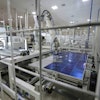NEW DELHI (AP) - India's largest automobile manufacturer, TataMotors Ltd., said Thursday it plans to set up a plant in the communist-ruled West Bengal state to manufacture a family car that will cost little more than $2,000.
The plant will be set up with an investment of 10 billion rupees ($220 million), and is expected to start production in two years, said Ratan Tata, the company's chairman.
A prototype of the five-seater model to be manufactured at the West Bengal plant is undergoing tests at a Tata facility in the western Indian city of Pune, Tata said.
He said the company aims to keep the car's price below 100,000 rupees ($2,200), making it the cheapest car on the Indian road. Currently, Maruti Udyog Ltd., in which Japan's Suzuki Motor Corp. holds a controlling stake, makes a compact hatchback that is India's cheapest car, selling for about 225,000 rupees ($5,000).
The Tata project is expected to create about 10,000 jobs at the plant and vendor chains.
Tata didn't say how many cars the proposed plant will produce each year. It also wasn't clear if the company planned to sell the car in overseas markets as well.
Tata's investment is significant for West Bengal, which the private sector has largely avoided since the communists came to power in the late 1970s.
While the Left Front - a coalition of parties led by the Communist Party of India (Marxist) - has been successful in its efforts to reduce rural poverty in West Bengal, urban unemployment has increased. Many businesses won't invest in the state, fearing labor unrest and problems in dealing with the communist administration.
But Tata, one of India's most respected businessmen, expressed confidence that the state was the right place to establish a new plant.
''We have come to believe that West Bengal is one of the most investor-friendly states,'' he said. ''I think someone has to turn this belief into a reality.''



















